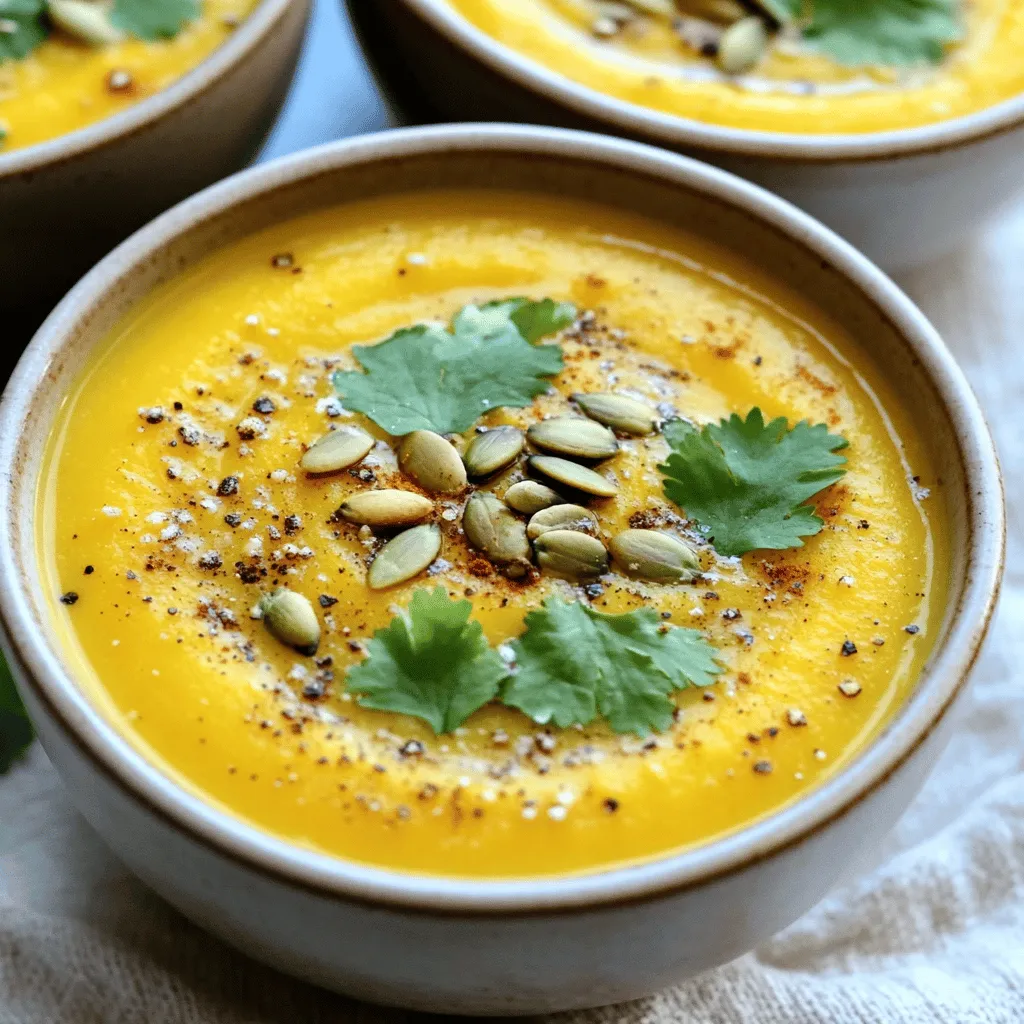Welcome to a warm bowl of bliss! This Coconut Curry Butternut Squash Soup is perfect for chilly days. With creamy coconut milk and rich curry, it’s a savory delight you won’t forget. In this post, I’ll guide you through gathering fresh ingredients, cooking, and crafting delicious variations. Let’s dive in and make a soup that warms your heart and fills your belly!
Ingredients
List of Ingredients
– 1 medium butternut squash, peeled, seeded, and diced (approximately 4 cups)
This is the star of the soup. Look for a squash that feels heavy for its size. Choose one with a smooth, firm skin and no soft spots.
– 1 tablespoon coconut oil
This oil adds a nice flavor. Try to pick organic coconut oil for the best taste.
– 1 medium onion, finely chopped
A good onion gives depth to the soup. Look for onions that are firm and have shiny skin.
– 3 cloves of garlic, minced
Fresh garlic adds zing. Choose garlic bulbs that are tight and plump.
– 1 tablespoon fresh ginger, grated
Ginger brings warmth and spice. Look for fresh ginger that is smooth and firm.
– 1 tablespoon red curry paste (adjust for desired spice level)
This adds heat and flavor. Find a brand you like; taste it first!
– 1 can (400ml) coconut milk
Creamy and rich, coconut milk makes the soup smooth. Check the can for quality and make sure it has no added sugars.
– 4 cups vegetable broth
Use homemade or store-bought broth. Look for low-sodium options for better flavor control.
– 1 tablespoon brown sugar (or maple syrup for a sweeter alternative)
This balances the flavors. Feel free to adjust the sweetness to your taste.
– Salt and black pepper, to taste
Essential for seasoning. Use fresh ground pepper for the best flavor.
– Juice of 1 fresh lime
Lime juice brightens the soup. Choose limes that feel heavy and have smooth skin.
– Fresh cilantro, for garnish
Adds a fresh touch. Look for bright green leaves without yellowing.
– Toasted pumpkin seeds, for garnish
They add crunch. You can buy them pre-toasted or toast them yourself for the best flavor.
Tips for Selecting Fresh Ingredients
– Always choose seasonal produce for the best flavor.
– Look for organic options when possible to enhance quality.
– Smell your spices to ensure freshness before purchase.
Possible Substitutes for Dietary Restrictions
– Use olive oil instead of coconut oil for a different flavor.
– Substitute butternut squash with sweet potatoes for a sweet twist.
– Ensure vegetable broth is gluten-free if needed.
– For a nut-free option, skip the pumpkin seeds or use sunflower seeds.
Step-by-Step Instructions
Preparation Steps
1. Sauté Aromatics: Start by heating coconut oil in a large pot over medium heat. Add the finely chopped onion. Sauté for about five minutes. The onion should become soft and see-through. Next, add the minced garlic and grated ginger. Cook for one to two more minutes. This step fills your kitchen with a warm, inviting smell.
2. Incorporating Squash and Curry Paste: Now, stir in the red curry paste. This will add a rich flavor to the soup. Let it cook for one minute to bloom the spices. After that, add the diced butternut squash. Make sure to mix well so each piece gets coated in the spicy goodness.
3. Simmering with Coconut Milk: Pour in the vegetable broth and coconut milk. Turn up the heat until the soup begins to boil gently. Once it boils, lower the heat and cover the pot. Let it simmer for about 20 to 25 minutes. You want the squash to be tender enough to pierce easily with a fork.
Blending and Finalizing
1. Tips for Using an Immersion Blender: After simmering, remove the pot from the heat. If you have an immersion blender, use it to puree the soup right in the pot. This saves time and makes cleanup easier. If using a countertop blender, let the soup cool slightly before blending in batches.
2. Adjusting Consistency and Seasoning: Once blended, return the soup to low heat. Stir in the brown sugar and fresh lime juice. This will balance the flavors perfectly. Season with salt and black pepper to taste. If it seems too thick, add a little more broth or water.
3. Importance of Taste Testing: Taste your soup before serving. Adjust any flavors as needed. This is key to making the soup truly yours. A quick taste can make a big difference, ensuring your Coconut Curry Butternut Squash Soup has that perfect blend of flavors.
Tips & Tricks
Enhancing Flavor
To make your Coconut Curry Butternut Squash Soup even better, focus on fresh herbs and spices. Fresh herbs, like cilantro, add vibrant flavor. You can sprinkle them on top just before serving for a burst of freshness. Spices should be fresh too. Ground spices lose their strength over time. Always check the date on your spice jars.
Lime juice is key in this recipe. It brightens the soup and balances the rich coconut milk. Start with half a lime and taste. If you want more zing, add more lime juice. The right lime balance can change the soup from good to great.
Adjusting the spice level is simple. If you like it hot, use more red curry paste. For a milder flavor, use less. Remember to taste as you go, so you get your perfect heat level.
Serving Suggestions
This soup pairs well with several side dishes. Warm naan or crusty bread works great. You can also serve it with a simple salad. The crunch of fresh veggies offers a nice contrast to the creamy soup.
For garnishing, consider fresh cilantro and toasted pumpkin seeds. They add color and texture. You could also drizzle a bit of coconut milk for a pretty swirl. A sprinkle of chili flakes can give a pop of color and extra heat.
Serve the soup warm, not hot. This way, you can enjoy all the flavors. If you let it cool slightly, it will taste better. Enjoy it straight from the pot, or ladle it into bowls for a cozy meal.

Variations
Dietary Alternatives
You can make this soup vegan by using vegetable broth and coconut milk. Both options are naturally dairy-free. To ensure it’s gluten-free, check that your curry paste is free from gluten.
To add crunch, consider using different toppings. Instead of pumpkin seeds, try crushed nuts like cashews or almonds. You can also add crispy chickpeas for extra texture. Fresh herbs like basil or mint can brighten the dish.
Flavor Profile Changes
You can change the flavor by adding different vegetables. Carrots or sweet potatoes work well with butternut squash. They add sweetness and depth. Try adding a handful of spinach or kale for a green boost.
Experiment with different curry pastes. Green curry paste offers a fresh, herbaceous flavor. Yellow curry paste gives a milder taste. Adjust the amount based on your spice preference. Each paste brings a unique twist to your soup.
Storage Info
How to Store Leftovers
To keep your Coconut Curry Butternut Squash Soup fresh, use airtight containers. Glass containers work well, allowing you to see the soup inside. Make sure the soup cools down to room temperature before sealing.
When it comes to refrigeration, store leftover soup in the fridge for up to five days. If you want to keep it longer, freezing is a great option. Pour the soup into freezer-safe bags or containers. Leave some space at the top, as the soup will expand when frozen. This method can preserve the soup for up to three months.
Reheating Recommendations
When you are ready to enjoy the soup again, reheating is easy. Pour the soup into a pot over low to medium heat. Stir it often to help it heat evenly. If the soup seems thick, add a splash of water or more vegetable broth.
You can also reheat the soup in the microwave. Use a microwave-safe bowl and cover it loosely with a lid or microwave-safe wrap. Heat in short bursts, stirring in between, until it’s hot. This method allows you to maintain the creamy texture and rich flavors, making sure each bite is as delightful as the first.
FAQs
Common Questions
Can I use frozen butternut squash?
Yes, you can use frozen butternut squash. It saves time and is very convenient. Just make sure it is thawed before cooking. This will help it blend well with the other flavors.
Is this soup recipe adaptable for a slow cooker?
Absolutely! You can make this soup in a slow cooker. Just sauté the aromatics first, then add them to the slow cooker with the other ingredients. Cook on low for 4-6 hours. This allows the flavors to meld beautifully.
How long will the soup keep in the fridge?
The soup will keep for about 4-5 days in the fridge. Store it in an airtight container. If you want to keep it longer, consider freezing it for up to 3 months.
Additional Questions
What can I serve with Coconut Curry Butternut Squash Soup?
This soup pairs well with warm naan or crusty bread. A simple salad also complements it nicely. You could add a slice of lime on the side for a fresh touch.
Can I make this recipe spicier?
Yes, you can increase the spice! Add more red curry paste or some chili flakes. Start with a little and taste as you go until it reaches your desired heat level.
How can I add protein to the soup?
To add protein, consider mixing in cooked chickpeas or shredded chicken. Tofu is also a great choice for a vegan option. Add it during the last few minutes of cooking to warm through.
This blog post covered the essentials for making Coconut Curry Butternut Squash Soup. You learned about the important ingredients, preparation steps, and tips to enhance flavor. We discussed variations to fit different diets and how to store leftovers properly.
Enjoy experimenting with this recipe. You can adjust flavors and textures to make it yours. With the right balance, this soup can be a comforting dish any time of the year. Happy cooking!




